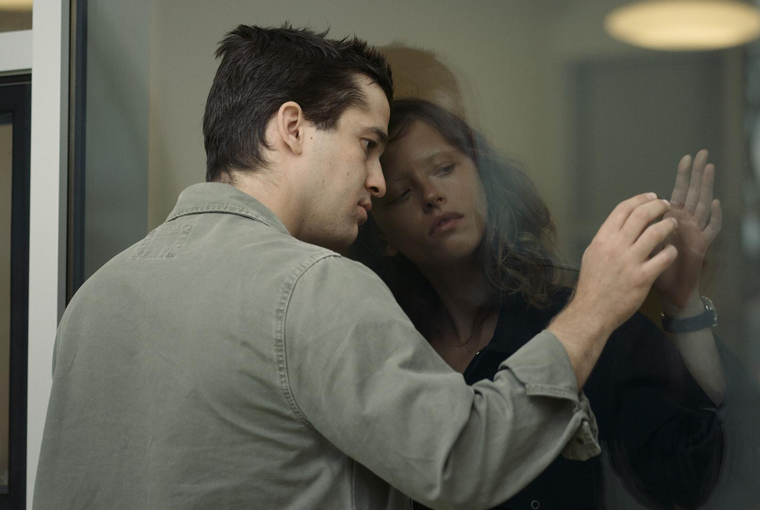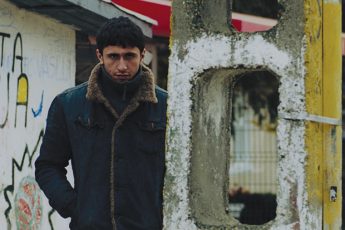“I'm About to Eat Your Heart!”
Alexander Zeldovich’s Medea (2021)
Vol. 121 (January 2022) by Jack Page
Medea navigates her way from Russia to Israel, cloaked in the shadow of her lover Alexei. After he promises to divorce his current wife, the “other woman” Medea mothers two of his children and moves away from her home country. She murders her own brother who poses a threat to Alexei’s fame and fortune. The murderous act builds a rift between the couple and Alexei decides to leave her for another. Her trust betrayed, she vows revenge and blinded by hatred sacrifices her own children to punish Alexei.
In this modern adaptation of Euripides’ play of the same name, a young woman’s descent into madness is chronicled through her encounters with other male characters. Even though the narrative of the film is heavily influenced by the Greek mythology subject matter, it is the themes of the protagonist’s journey that truly embody the tragedy of Medea. Both cinematic and literary incarnations portray a symbol of female rebellion wherein Medea rejects the archetypal role of wife and mother. The filmic version leans heavily into Medea’s sexual liberation, the anti-heroine finding herself emancipated from her affair with Alexei by sleeping with other young suitors. Importantly, these flirtatious young bucks are never able to abuse their sexual prowess over Medea as she is subject to mysterious seizures mid-coitus. Brought upon by heightened sensations of panic or ecstasy, her eyes roll back into her head and she falls unconscious, her body collapsing doll-like into her lovers. Occasionally, these blackouts are accompanied by surreal visions – a clear reference to Euripides’ text, where the eponymous sorceress is blessed with the power of prophecy. Both iterations of Medea also commit filicide to satisfy their thirst for vengeance, an ultimately self-serving comeuppance for both parents. The final act of Medea could be interpreted as an extreme exercise in hubris. Her greatest strength is her passion, her vivacity, but it is her anger that inexorably is her undoing to humanity. The painful life of Medea is an impossibly resolved trajectory: she either submits to her oppressive and abusive male counterparts and is seen as weak or fights back, risking more suffering and anguish to herself.
Early in the film, Medea asks Alexei what he believes happiness is, to which he replies: “Happiness is being understood.” Medea’s character is meanwhile far removed from any realistic performance that the audience might understand or try to translate. Instead, Shai Assido’s otherworldly representation of the female in crisis is an act grounded in the allegorical, and the film’s director Alexander Zeldovich employs some devilishly eccentric setups that visually symbolize Medea’s psychological breakdown. At the height of one of Medea and Alexei’s intense altercations, she reveals the loss of control over her emotional stability. Alexei walks away from the scene of hysterics, Medea beating the floor with her fists in a child-like tantrum. Her figure shrinks in the enormous domestic interior of the affluent villa setting. She is dressed in nothing but a baggy t-shirt, resembling a patient from a psychiatric hospital, as if struggling against the restraints of a straitjacket. Medea’s gestures are like a woman possessed: she convulses, wild-eyed and ferocious, muttering to herself. She screams through her tears, counting down from her genuine age of twenty-nine as she tries to convince Alexei she is not too old for him. She crawls on all fours to a rounded, red leather sofa, curling into the fetal position. This image of total regression places Medea back in the womb, shot from a birds-eye point of view, like a medical illustration. It is a brilliant sequence that – perhaps due to the male-orientated direction of the scene – intends to convey the nurturing power of womanhood alongside its heightened sensibility. Arguably, this reading is a little uneven, but it would adhere to the rest of the film’s ideological aims. Here, Medea is both the strongest and most vulnerable version of herself: her own worst enemy.
Interestingly, Alexei is unsympathetic to Medea’s mental well-being and this perspective is dangerously close to being shared by the spectator as a result of the inconsistent impression Zeldovich creates. Almost immediately after the film begins, Medea is villainized when she murders her brother in cold blood. There is no context or exposition of his claiming that Alexei is a crook. Consequently, the murder looks like a selfish rather than selfless act. Our knowledge of Medea and Alexei’s romance is minimal at this stage, and it appears she is merely worried that her future plans of wedding a Jewish billionaire are in jeopardy. Her brother’s execution is done with a swift professionalism. Medea is calm and collected as she pulls the trigger and drives the body into a frozen river. As the truck slowly sinks, her hardened stare shows no remorse or sadness. The eyes reveal nothing but a dead calm.
Similarly, there are a number of other scenes that dehumanize Medea further, exposing her immature naivety and severe possessive qualities. She even goes so far as to set fire to a competitor that took an interest in Alexei at a rooftop fashion shoot. At another intimate gathering, Medea has a sudden violent outburst with another guest who light-heartedly intends to belittle a drunken Alexei. This one-sidedness constructs an unfair and unrelatable anti-heroine in Medea. I believe her character arch has the potential of recreating a complex but humane feminine role model, which is sadly undermined by her excessively barbarian exploits. Nonetheless, Assido is a force to be reckoned with in Medea, and there is a subtle psychoanalytical reading on offer for any willing spectator.




Leave a Comment